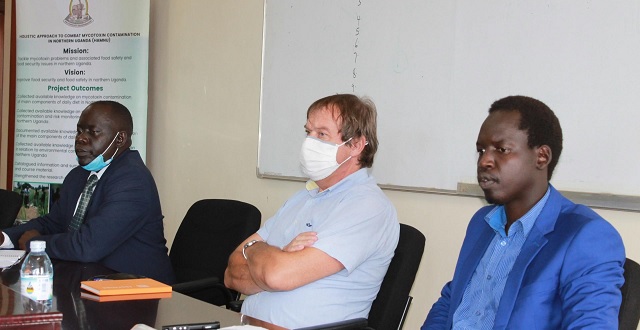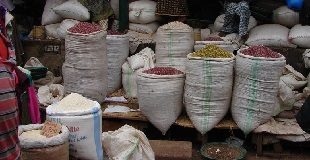
Gulu, Uganda | THE INDEPENDENT | Scientists in Northern Uganda have launched a campaign aimed at promoting the production and consumption of safe food as well as preventing contamination.
The campaign dubbed, ‘Safe Food Africa Movement’ was rolled out following shocking results of research by Gulu and Ghent Universities which discovered that over 80% of grain food produced and consumed in the northern region is contaminated with mycotoxins and 98% of the humans sampled in the region are already affected, presenting with high levels of mycotoxins traces in their bodies.
The three-year-long research titled Holistic Approach to Combat Mycotoxin Contamination in Northern Uganda (HAMNU) was led by Associate Professor Dr. Richard Echodu, the Head of Gulu University Faculty of Agriculture and Environment with funding from Ghent University.
Mycotoxins are toxic compounds that are naturally produced by certain types of molds (fungi) which include aflatoxins, fumonisins, ochratoxins, and deoxynivalenol.
Experts say consuming food containing mycotoxins is associated with health risks like liver cancer, immuno-suppression, loss of appetite, hepatitis B, growth impairment, immune malfunction, and acute exposure is fatal.
Godfrey Wokorach of Gulu University, who is among the research team and part of the movement told URN on Wednesday that one measure is engaging the community in the awareness of the extent of mycotoxin problems which are associated with poor food handling.
He adds that the priority seeks to involve members of the community, and sensitize them on food processing, storage, post-harvest management, pest challenges in the field, and field management as possible causes of food contamination from home.
Some of the best practices he named include thorough drying of cereals, timely harvest, avoiding intercropping of similar crop varieties, practicing crop rotation, using improved seeds, early preparation, and good storage.
Besides creating awareness, scientists at Gulu University say they are using organisms to control aflatoxins and have been proved to work very well in other parts of the world.
Wokorach who wooed all stakeholders to join the movement explains that they have developed biocontrol measures and tried to develop aflatoxin biocontrol candidates to be enrolled for aflatoxins control in Uganda.
Associate Professor Dr. Richard Echodu, the Head of Gulu University Faculty of Agriculture and Environment agrees that crop contamination is dangerous and recommends good farming practices to prevent contamination.
*****
URN
 The Independent Uganda: You get the Truth we Pay the Price
The Independent Uganda: You get the Truth we Pay the Price


